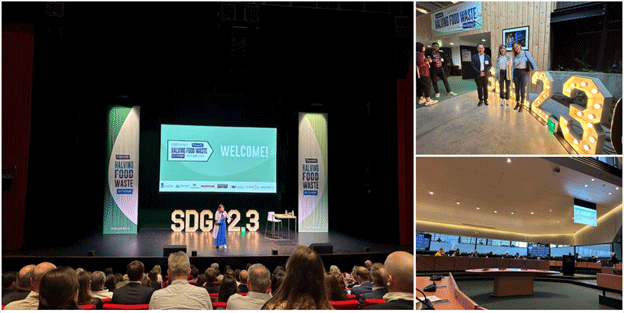On 18 June, Europatat attended the international conference ‘Towards halving food waste in Europe,’ organized by Food Waste Free United with support from the EU Commission in Veghel, the Netherlands. The event brought together over 370 participants from 33 countries, including businesses, governmental representatives, scientific organizations, and civil society, all united in their commitment to achieving Sustainable Development Goal (SDG) 12.3.
A Collaborative Effort to Tackle Food Waste
The conference provided a comprehensive platform for sharing strategies and innovations aimed at reducing food waste across Europe. Discussions highlighted the importance of collaboration among various stakeholders to meet the ambitious target of halving food waste by 2030, as outlined in SDG 12.3. Topics ranged from legislative updates to practical solutions implemented by businesses and communities.
Legislative Framework and Future Plans
Updates from the EU Commission
On 19 June, during the plenary meeting of the EU Platform on Food Losses and Food Waste, the EU Commission presented the latest updates on the legislative proposal for amending the Waste Framework Directive. The amendments focus on enhancing food waste prevention measures, improving data collection, and establishing clear targets for reduction. Key elements of the Belgian Presidency’s compromise text were also discussed, emphasizing a balanced approach to food waste reduction while considering economic and social factors.
Upcoming Initiatives
A notable announcement came from the Hungarian Ministry of Agriculture, which will organize a food waste prevention conference in cooperation with the FAO in Budapest on 1 October 2024. This event aims to further the dialogue on innovative solutions and best practices in food waste prevention, reinforcing the collective effort towards achieving SDG 12.3.
Practical Solutions and Innovations
Business and Community Initiatives
The conference showcased various successful initiatives from businesses and communities aimed at reducing food waste. For instance, several retailers and food service providers have implemented advanced inventory management systems, donation programs, and consumer education campaigns to minimize waste. Additionally, community-based projects that promote food sharing and redistribution were highlighted as effective grassroots solutions.
Technological Advancements
Technological innovations play a critical role in reducing food waste. Examples include smart packaging that extends shelf life, apps that connect consumers with surplus food from retailers, and AI-driven tools that optimize supply chain logistics. These technologies not only help reduce waste but also contribute to overall efficiency and sustainability in the food system.
The international conference in Veghel underscored the importance of a multifaceted approach to tackling food waste, combining legislative action, technological innovation, and community engagement. As the EU continues to advance its food waste reduction strategies, the collaborative efforts of all stakeholders will be essential to achieving the ambitious goal of halving food waste by 2030. The upcoming conference in Budapest will further strengthen these efforts, providing a platform for continued dialogue and action.







